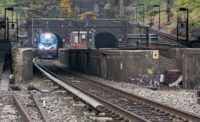The long-awaited expansion and upgrade of the century-plus-old Hudson River rail tunnel between New York and New Jersey is “taking big steps” toward getting underway in two years, said a leader of the agency overseeing the estimated $11.6-billion project.
Speaking Nov. 16 at a Gateway Development Commission meeting, co-chair Balpreet Grewal-Virk credited a productive relationship with the Biden administration and the recently enacted federal infrastructure bill’s $30-billion allocation for Northeast Corridor rail upgrades in her forecast of a 2023 construction start. The major regional transportation project languished for four years under the Trump administration.
Grewal-Virk speculated that engineering on a new two-track tunnel and rehabilitation of the existing 110-year-old, nearly 100-ft-deep tubes could begin next year, with full construction getting underway in mid-2023. The entire project is expected to take approximately 12 years to complete, according to the commission, with the new tunnel set to cost $9.8 billion and rehabilitation work priced at $1.8 billion.
That timetable is contingent on the project improving its current “medium-low” priority rating by the Trump-era Federal Transit Administration. That made the tunnel replacement and upgrade ineligible for the agency’s Capital Investment Grant program, despite warnings of economic catastrophe should a failure occur on one or both of the deteriorating existing tunnels that carry 200,000 NJ Transit and Amtrak passengers daily.
Following a new record of decision in May on the project’s environmental impact statement, issued by the Biden administration's U.S. Transportation Dept., the Commission submitted a revised cost estimate and financial plan. It included beefed-up commitments from New Jersey and New York state governments, with the Port Authority of New York and New Jersey set to fund half the total construction cost.
Changes in railroad loan programs included as part of the federal infrastructure bill will benefit the states’ funding strategies, as the previous 35-year payback period was more than doubled to 75 years.
Amtrak, which will receive $66 billion in new infrastructure funding, also increased its Gateway tunnel commitment under the financial plan to $1.34 billion. The agency also took advantage of the record of decision to purchase a needed property it says will help mitigate about $700 million in potential delay-related cost increases.
With the FTA's re-rating decision expected next year, project partners are working on strategies to select an engineer and construction manager, as well as delivery approaches. According to a commission spokesperson, some contract packages will likely be design-build, while others may use design-bid-build.
Amtrak, Port Authority and NJ Transit have also invested $86.5 million in environmental planning and preliminary engineering to ready the project for a fast start to construction.
Design firm WSP Global now leads a supplemental geotechnical effort that includes 13 borings of more than 100 ft deep on recently acquired properties above the new tunnel’s alignment.





Post a comment to this article
Report Abusive Comment